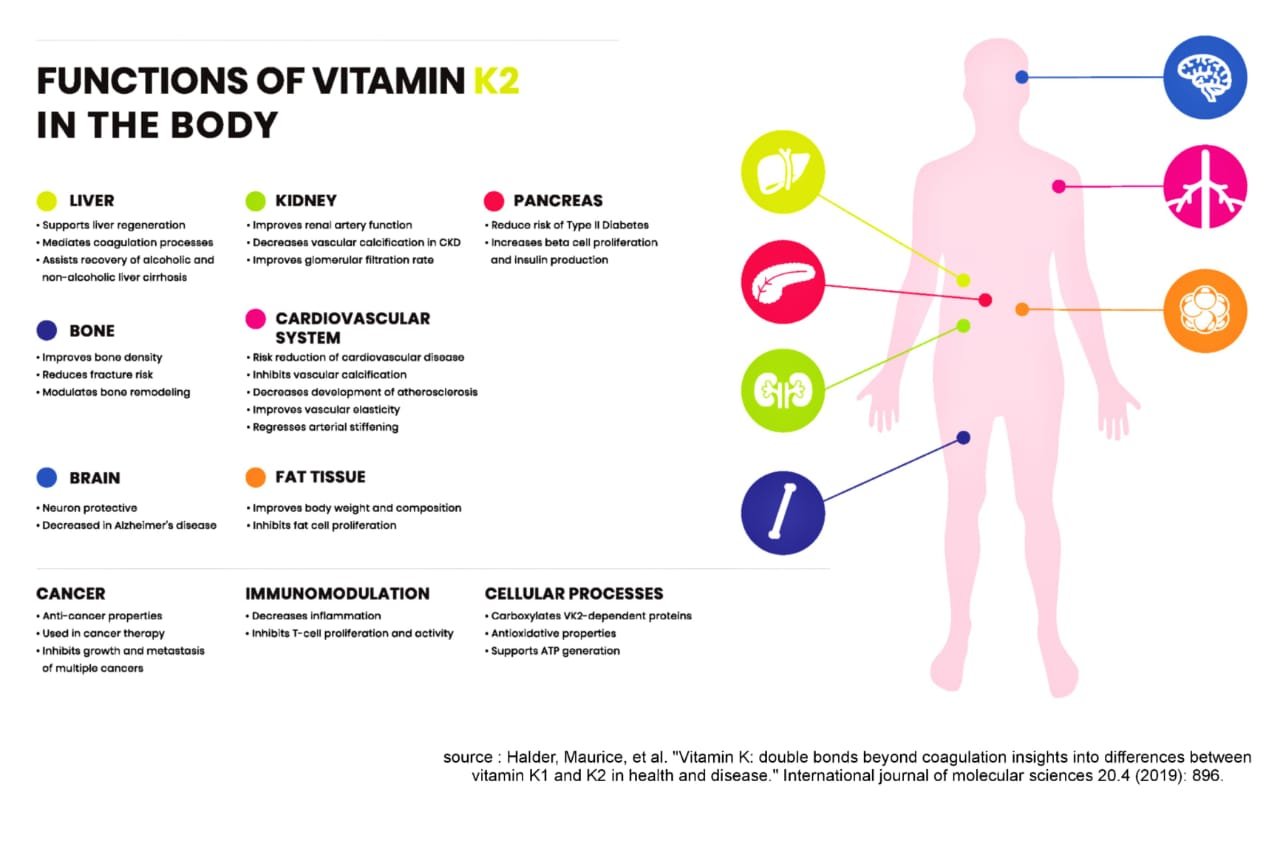Vitamin K : A necessity in human nutrition
Vitamin K is a group of fat-soluble vitamins that play a key role in the synthesis of hepatic blood coagulation proteins, in bone health, cardiovascular health, prevention of cancer, and suppression of inflammation, prevention of brain oxidative damage, sphingolipid synthesis, and osteoporosis.
In nature, vitamin K occurs in two main forms namely, phylloquinone (vitamin K1) and various menaquinones (vitamin K2). Vitamin K2 is a fat-soluble vitamin that has an ability to cross the blood brainbarrier (BBB) due to its lipophilic nature. Apart from natural Vitamin K, synthetic derivatives such as menadione and menadiol diacetate, that can be metabolized to phylloquinones are also present [2]. Main sources of phylloquinones include plant-based foods like leafy vegetables, fruits, etc. whereas sources of menaquinones include animal-based foods like meat, fishes, dairy products, etc.

Menaquinones having long chains such as MK-7 (or K2-7) to MK-13 are primarily synthesized by bacteria that include species of aerobic, anaerobic, facultative, as well asobligate anaerobic bacterial species. Some of these bacterial species are present as microflora in the gut. MK-7 or K2-7 is found to be present in very high concentration in a Japanese traditional food called natto. Natto is made by fermenting soybean using Bacillus subtilis. Another source of menaquinones is the microflora of intestine. Although intestinal synthesis has been shown to produce significant quantities of menaquinones, absorption from this source is inefficient to fulfill the required quantities.
Generally, vitamin K1 is a fat-soluble vitamin that is present in leafy green vegetables. It is essential for normal coagulation. It functions as a cofactor required for the activity of vitamin K-dependent (VKD) proteins. Phytonadione (vitamin K1) is a medication used to treat and manage vitamin K deficiency, which is a significant risk factor for intracranial hemorrhage and other bleeds and treat coumarin overdoses.
Vitamin K also plays an important role in bone health. Vitamin K is essential for the synthesis of osteocalcin, a protein that is necessary for bone formation and remodeling. Osteocalcin helps to bind calcium to the bone matrix, which makes bones stronger and more resistant to fractures. Studies have shown that vitamin K deficiency can lead to a decrease in bone mineral density and an increased risk of fractures. On the other hand, getting enough vitamin K through the diet supplementation has been associated with improved bone health.
Vitamin K2-7, also known as menaquinone-7 (MK-7) is a form of vitamin K that has health-beneficial effects in osteoporosis, cardiovascular disease, inflammation, cancer, Alzheimer’s disease, diabetes and peripheral neuropathy. Compared to vitamin K1 (phylloquinone), K2-7 is absorbed more readily and is more bioavailable. Clinical studies have unequivocally demonstrated the utility of vitamin K2-7 supplementation in ameliorating peripheral neuropathy, reducing bone fracture risk and improving cardiovascular health. Studies have also demonstrated K2-7-mediated suppression of growth in cancer cells via cell-cycle arrest, autophagy and apoptosis. K2-7 is also responsible for suppression of proinflammatory mediators such as IL-1α, IL-1β and TNF-α.

In bones health, K2-7 aids in stimulation of osteoblastic formation of bone and suppression ofosteoclastic resorption of bone. In osteoblastic cells, K2-7 helps inprotein synthesis of osteocalcin and various other proteins. Cellular functions in osteoclastic and osteoblastic cells areperformed by various proteins, whose expression is regulated byK2-7. Osteocalcin produced by osteoblastsbinds to calcium present in blood circulation and leads it to the bone matrix. Bone mineralization is influenced by osteocalcin as it has high affinity towards hydroxyapatite, a mineral component of bone; this results in stronger skeleton and less susceptibility tofracture. The newly synthesized osteocalcin is inactive and it requires vitamin K2-7 for converting itself into active form by carboxylation, and later bind to calcium. Vitamin K2-7 is a cofactor of enzyme γ-carboxylase, that converts glutamic acid residues present in the molecule of osteocalcin to γ-carboxyglutamate and is, therefore, necessary for the γ-carboxylation of osteocalcin.
Clinically, supplementation with calcium and vitamin K2-7 aids in the treatment or prevention of certain conditions due to low levels of calcium and vitamin D such as bone loss (osteoporosis), weak bones (osteomalacia/rickets) and decreased activity of the parathyroid gland (hypoparathyroidism), other bone disorders.
[2] Halder, Maurice, et al. “Vitamin K: double bonds beyond coagulation insights into differences between vitamin K1 and K2 in health and disease.” International journal of molecular sciences 20.4 (2019): 896.
